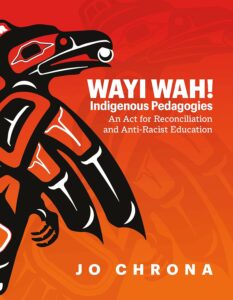Author Jo Chrona explains that Wayi Wah!—the title of her 2022 book on Indigenous pedagogies—translates as “Let’s go!” or “It’s time!” in Sm’algyax, the language of the Ts’mysen people of north coast British Columbia that she belongs to. It is clear the intent of this engaging read is to usher a call to action for educators to adopt new perspectives and pedagogies in order to improve learning for all students. Ironically, as one reads Wayi Wah! they soon discover that the perspectives and pedagogies are not actually new at all, but have been embedded and practiced within Indigenous cultures for generations, if not millenia.
American Christian educators who simply desire to wrestle with their particular status quo and seek a more biblical way of fulfilling their calling will be better equipped by reading this resource.
Until quite recently, Indigenous pedagogies and ways of being have been tragically ignored at best and aggressively oppressed and nearly eradicated at worst by the dominant Western culture. Thankfully, we are now living and teaching at a pivotal moment in Canadian history, as this country comes to terms with its complicated colonial history—specifically its aggressive assimilationist policies aimed at the eradication of Indigenous people and culture through the failed residential school experiment. American readers of this review will have to forgive me for not being as familiar with the current cultural realities in their country, but I venture to guess that even if the United States’ historic (and perhaps) contemporary treatment of American Indigenous people is not yet a topic of national conversation, it soon will be. And even if other pressing realities silence this necessary national conversation for a time, American Christian educators who simply desire to wrestle with their particular status quo and seek a more biblical way of fulfilling their calling will be better equipped by reading this resource.
I have come to recognize after a lifetime of teaching and working in Christian education that we are not always good at recognizing how we have allowed idolatrous, Western ways of being to insidiously become part of what we consider a biblical worldview.
Regardless of whether we are fulfilling our calling as Christian educators in the United States or in Canada, many of us in our particular Christian school traditions are well versed and accustomed to developing a biblical worldview in our students to ensure “we take captive every thought to make it obedient to Christ” (2 Cor. 10:5) so that we “do not conform to the pattern of this world, but [are] transformed by the renewing of [our] minds” (Rom. 12:2). I am convinced that Wayi Wah! can help us in this very process, even though Chrona is writing specifically for K–12 public school teachers in the province of British Columbia. I have come to recognize after a lifetime of teaching and working in Christian education that we are not always good at recognizing how we have allowed idolatrous, Western ways of being to insidiously become part of what we consider a biblical worldview.
This is an abridged version of this article. To read more, subscribe to the print or digital edition of Christian Educators Journal.
Jonathan Boone is the vice principal at Vernon Christian School, and lives in Vernon, BC, the home of the Syilx people since time immemorial. He is passionate about helping Christian schools work toward reconciliation with Indigenous people.
Works Cited:
Chrona, Jo. Wayi Wah! Indigenous Pedagogies: An Act for Reconciliation and Anti-Racist Education. Portage & Main Press, 2022.
